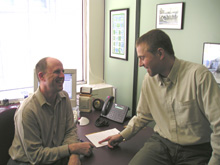Business profs analyze leaky condo dispute

Martin L. Martens (left) and Kai Lamertz
Photo by Patrick Lavery
The leaky B.C. condo affair cost millions of dollars, infuriated homeowners, and severely affected the west coast housing market.
Management professors Martin L. Martens and Kai Lamertz have a $58,178 grant from the Social Sciences and Humanities Research Council to study the social factors in a scandal that rocked British Columbia.
Martens said, “We're looking at how the builders, the owners, the unions, the workers, the government made sense of the issue.”
Just as pressure is exerted on a physical structure, pressure can be exerted on a social structure, he explained.
“What happens when more pressure is exerted on the structure than it can bear? At first, no one had any idea who was affected by the crisis, but when it’s 10,000 people affected, you have to pay attention.”
Eighty thousand condos have been identified as leaky, with repairs costing homeowners an average of $30,000 each.
The professors have gathered documents from the early 1990s, when the problem began to appear, to the present.
“We've collected print reports, press releases, and statements made by various people involved, like the builders, unions and home owners,” Lamertz said.
“We’re looking to identify specific rhetorical and conversational patterns in these documents.”
Martens added, “What these people said is how the battlefield was shaped.
“We look over the last 15 years of statements made by stakeholders and how they changed to adapt to pressure placed on them by another stakeholder. Were they successful in redefining the meaning of the crisis?"
"It's reputation management," Lamertz said. "If people construct what has happened as partially your responsibility, your ongoing role will be viewed in a negative light. All these players had to deal with the problem of the leaky condos and not risk ruining their reputation at the same time.”
Lamertz likened the issue to the current NHL labour dispute, in which each side, owners and players, constructs a different version of what happened and lays blame on the other.
“There are more people involved [in the hockey lockout] than just the players and owners. Fans, bar owners, TV broadcasters, merchandisers are all affected, and they have their opinions on what is happening."
As well as the text and language data they have compiled, Martens and Lamertz plan to interview some of the people involved in the scandal, including the architects and contractors who built the condos.
"We want to get their view as they look back on it," Martens said. "How has it changed?"
The study is not looking to assign blame to any one group involved in the scandal.
"There were many factors that led to the leaky condos," said Martens. "Shoddy construction, lack of oversight, inappropriate design, lack of inspections, hiring of inexperienced people all played a part, but you also had owners doing a 'patch and run.' They would patch up the most visible problems, like water stains, and then sell the condo."
Martens himself owned a leaky condo when he lived B.C. By coincidence, someone on the committee [of SSHRC] knew I was a leaky condo owner and I would be very vigorous in my research.
He admits that for the homeowners who were stung, “it's a very emotional issue. In some cases, they are ashamed.”
This is not the first study sparked by the billion-dollar B.C. condos issue by Concordia researchers.
Last February, CTR brought you news of a huge, $2-million research project involving three universities and 10 industrial partners.
Led by Professor Paul Fazio, it is looking into the wetting and drying characteristics of walls. Assistant Professor Dominique Derôme is also involved in the project. Both are in the Department of Building, Civil and Environmental Engineering.